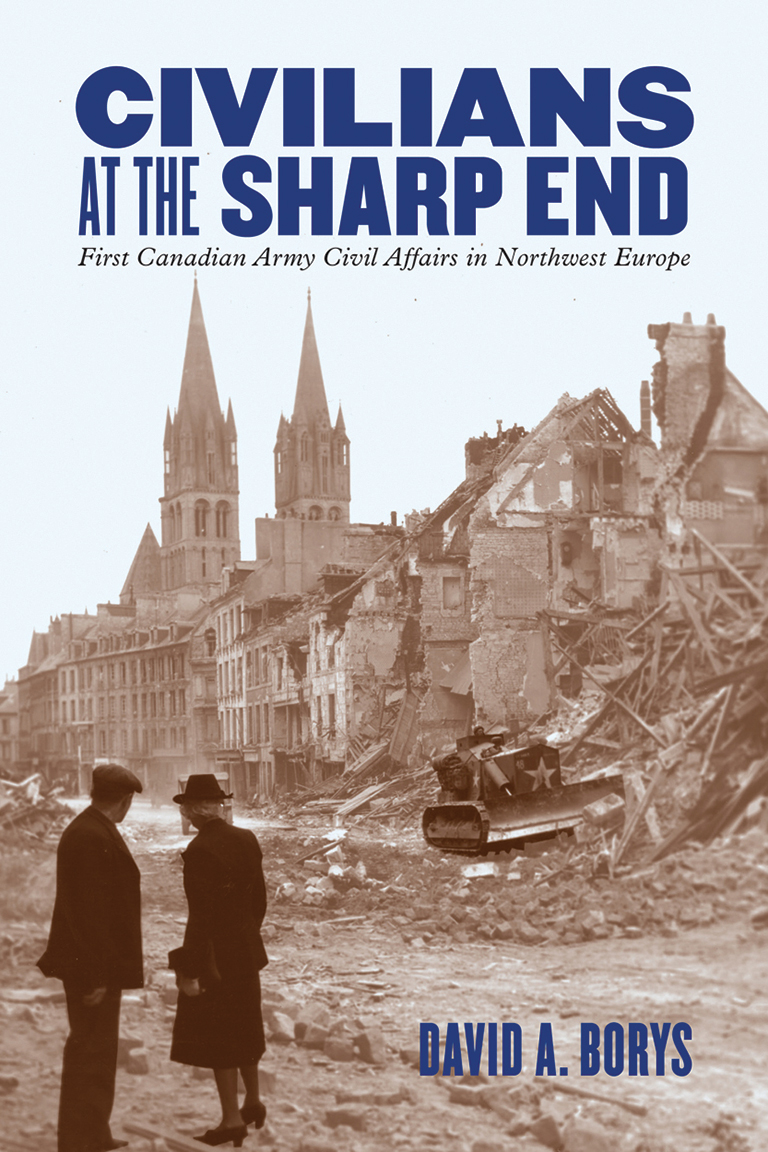Civilians at the Sharp End

Civilians at the Sharp End: First Canadian Army Civil Affairs in Northwest Europe
by David A. Borys
McGill-Queen’s University Press
268 pages, $39.95
Nazi Germany was defeated in May 1945 after having caused the Second World War that killed an estimated sixty million people. The Nazis brought tremendous suffering and grief to the world and, most terribly, to the occupied people and nations that were exploited and brutally oppressed. In Western Europe, the French, Belgians, and Dutch suffered greatly under the occupation. As the Allies drove back the Germans in battle from June 1944, they also had to deal with the challenges faced by these newly liberated people.
In Civilians at the Sharp End, David Borys, an academic historian and the host of the podcast Cool Canadian History, tells for the first time the story of the Civil Affairs branch of the First Canadian Army. These soldiers, who were generally older and unfit for combat but had strong language and organizational skills, were ordered to follow the fighting forces and to help with restoring broken communities that had been freed through fighting.
The Civil Affairs soldiers cut their teeth in Italy in 1943, but they suffered from the lack of a centralized strategy and from a shortage of resources. Matters were improved in France in the summer of 1944, especially regarding the massive job of rebuilding the city of Caen, near the Normandy beaches, after armadas of bombers had destroyed it and after soldiers, including Canadians, had fought through the rubble.
Food and medicine were provided to survivors, while hundreds of French civilians and German soldiers lay dead in the ruins. Their rotting bodies were a health hazard, and it was as important to clear and to bury their remains as it was to restore electricity and to bring food supplies. “It was hell,” recounted one French civilian. “Everything had been destroyed.” In later campaigns, Civil Affairs soldiers often led French civilians away from battlefields before the fighting began, thanks to short truces established with the Germans.
As the Allies slowly drove the Germans out of France and Belgium in the late summer and fall of 1944, they were forced to address the countless war refugees. They worked with the many resistance organizations that had fought the Germans, but these were difficult relationships because there was much conflict between various groups and governments in exile. On the ground, the public execution of collaborators was difficult for Canadians to witness.
The greatest challenge was the liberation of the Dutch people, who had been systematically starved by the Germans in an attempt to force their compliance. The malnourished population had to be fed, and the distribution of coal was essential over the cold winter of 1944–45.
Borys also looks at the Civil Affairs group in Germany, where it was part of an occupying force. “We come as conquerors,” wrote one military engineer, and yet they also set about rebuilding Germany. The millions of displaced people and freed slave labourers (many of them Russian prisoners of war) had to be cared for and fed. Sometimes the German people were protected against roving bands of freed prisoners who were seeking vengeance.
Civilians at the Sharp End is a welcome addition to the work of understanding the aftermath of war. This type of work during the Second World War was little acknowledged in previous books and articles, while there has perhaps been a greater understanding of the key role of units similar to Civil Affairs after disastrous twenty-first-century wars in Afghanistan and Iraq. Even when key battles have been won, wars have been lost due to the failure to understand that fighting and victory must be followed by restoration and rebuilding.
Themes associated with this article
Advertisement




